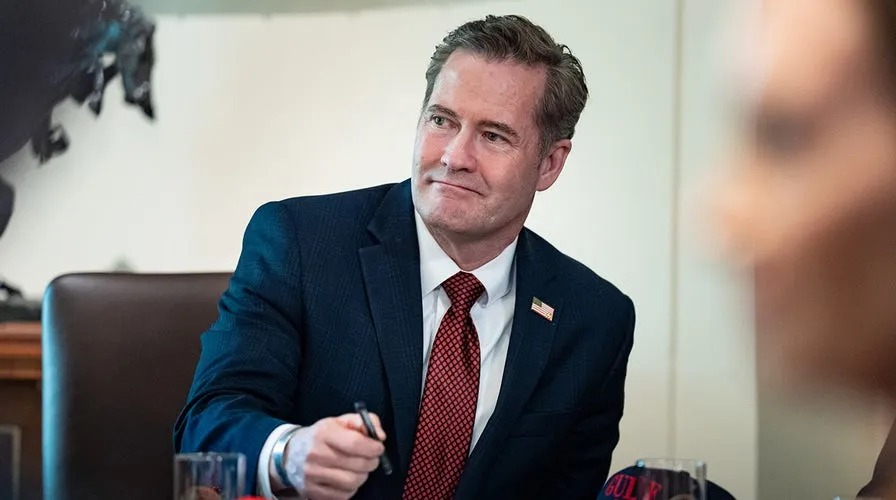Mike Waltz Faces Senate Confirmation Hearing for UN Ambassador Role
This week, Congressman Mike Waltz, a Republican representing Florida, took center stage in a highly anticipated Senate confirmation hearing for his potential appointment as the United States Ambassador to the United Nations. With President Trump’s previously established tough-on-diplomacy approach hanging in the balance, many observers are closely watching how Waltz aligns with the administration’s foreign policy goals.
Background on Mike Waltz
Mike Waltz has built a career that bridges military service and political engagement. A former Green Beret and an advocate for conservative values, Waltz served in Afghanistan and has maintained a strong focus on national security issues throughout his political career. His experience in the armed forces, combined with his role as a public servant, positions him as a key player in the Trump administration’s strategy at the UN.
The Significance of the UN Ambassador Position
The UN Ambassador is not just a ceremonial role but rather a critical position that helps shape U.S. foreign policy on a global stage. The UN serves as a platform for addressing significant international concerns, from climate change and humanitarian crises to armed conflicts and violations of human rights. Thus, who occupies this position can profoundly affect U.S. relations with allies and adversaries alike.
Live Updates from the Hearing
During the live hearing, which took place before the Senate Foreign Relations Committee, Waltz laid out his vision and objectives for U.S. leadership at the UN. He emphasized the importance of restoring American authority and credibility in international discussions, which he believes have been undermined in recent years.
Key Points from Waltz’s Testimony
- Engagement with Allies: Waltz asserted that strong relationships with allies are crucial for effectively addressing global issues. He highlighted a commitment to strengthening ties with longstanding allies and engaging with newer partnerships.
- Critique of China: In his opening remarks, Waltz outlined a critical stance against China, citing its increasing influence in the UN and its implications for American interests. He reiterated the need for a united front against what he termed ‘aggressive behaviors’ by the Chinese government.
- Support for Israel: Waltz passionately voiced support for Israel, affirming its status as a vital U.S. ally. He addressed concerns regarding renewed tensions in the Middle East and reinforced Trump’s policy direction, which emphasizes Israel’s security.
- Focus on Human Rights: Waltz expressed a commitment to prioritizing human rights within the UN agenda, particularly when it comes to nations with poor human rights records, such as North Korea and Iran.
- Financial Accountability: Waltz sought to assure lawmakers of his intent to ensure financial accountability within the UN, pledging to scrutinize budget proposals that do not align with U.S. interests.
Challenges Ahead
While Waltz’s testimony was confident and assertive, he faced tough questions from Senate committee members, particularly from Democrats who expressed concerns regarding the Trump administration’s approach to multilateralism and diplomacy.
Senator Critiques
Senator Bob Menendez, the chair of the committee, questioned Waltz on Trump’s previous decision to withdraw from the UN Human Rights Council, suggesting that it sent a message of disengagement. Menendez challenged Waltz to explain how he would navigate the complex waters of international politics when the U.S. has distanced itself from crucial talks.
Another pressing issue was the ongoing pandemic and its global implications. Senator Chris Murphy emphasized the importance of global cooperation in combatting diseases. He raised concerns about how a ‘go-it-alone’ strategy could hinder global health efforts. Waltz responded by stressing the need for the U.S. to take a leadership role while maintaining its interests.
Consequences of the Hearing
The outcome of Waltz’s confirmation hearing could have lasting repercussions not only for U.S. foreign policy but also for the reputation of the Trump administration. If confirmed, he will have the challenging task of navigating an increasingly polarized political environment, both domestically and internationally.
The Road Ahead
As the Senate committee deliberates on Waltz’s confirmation, the political landscape continues to shift. The outcome is expected soon, and all eyes are on how the Senate will respond to his nomination amid a climate of heightened scrutiny regarding the administration’s handling of international relations.
Ultimately, Mike Waltz’s position as the UN Ambassador could redefine how the U.S. approaches global challenges in a rapidly changing world. Whether he can bridge the gaps created by recent policy shifts and unite U.S. interests with those of the wider international community remains to be seen. As the world watches this unfolding narrative, Waltz’s confirmation hearing will undoubtedly go down in history as a crucial moment in U.S. diplomacy.
Conclusion
The Senate confirmation hearing for Mike Waltz has underscored the complexities and challenges of U.S. foreign policy in the contemporary global landscape. With significant issues hanging in the balance, from the COVID-19 pandemic to geopolitical tensions, Waltz’s vision for the UN role will be pivotal in shaping the future diplomatic tone of the United States under the Trump administration.







